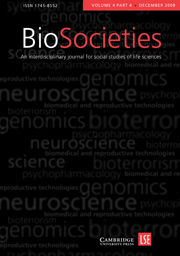Article contents
Changing Brains: The Emergence of the Field of Adult Neurogenesis
Published online by Cambridge University Press: 22 December 2009
Abstract
The increasing appreciation of structural plasticity, namely the capacity of the nervous system to alter not only its function but also its constitution in response to changing conditions, indicates a profound transformation in the scientific comprehension of the human brain. The research on adult neurogenesis, i.e. on the de novo formation of neurons in the mature brain, has been chosen as a circumscribed field to study the controversies that accompany the transition from the concept of a stable to that of a structurally plastic mammalian brain. Building on the concepts of thought style and thought collective developed by Ludwik Fleck, this article investigates the ways in which neurogenesis in the adult brain has changed from being negated to being accepted and highly valued, and consequently has become the focus of a novel research field. This analysis covers a period from the second half of the twentieth century up to the present. The development of research on adult neurogenesis has been shaped by two opposing views: the understanding of a particularly immutable and thus specifically human brain on the one hand, and a plastic brain which remains malleable during the entire adult life, on the other hand. This plastic human brain has created new space for the articulation of the ‘therapeutic promise’, since it lends itself much more readily to therapeutic intervention than a stable brain: the article argues this to be decisive in promoting the transformation of thought style within the neurosciences.
Information
- Type
- Articles
- Information
- Copyright
- Copyright © London School of Economics and Political Science 2009
References
- 32
- Cited by

